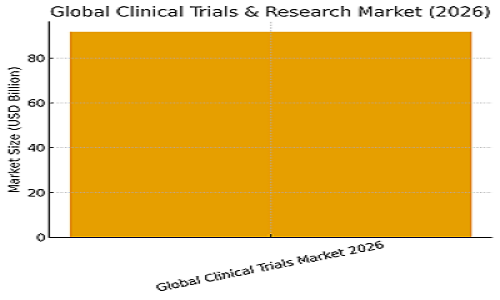Sessions and Tracks
Advances in Patient-Centric and Precision Clinical Trials
Recent research in clinical trials has focused on enhancing patient-centric approaches, improving data accuracy, and advancing precision medicine. Patient-centric trials, emphasizing patient needs and preferences, have become pivotal, especially with the rise of decentralized and hybrid trial models. These models, which incorporate digital technologies like wearables, telemedicine, and mobile applications, allow for remote monitoring, reducing patient burden and increasing participation diversity. Additionally, real-world evidence (RWE) is gaining traction as researchers incorporate data from electronic health records, patient registries, and wearable devices to complement traditional clinical trial data, thus improving trial relevance to broader patient populations.
Precision medicine continues to shape clinical trials, with targeted therapies and biomarker-driven studies designed to optimize treatments for specific patient groups based on genetic, environmental, and lifestyle factors. Ethical considerations, particularly around data privacy and informed consent in these new trial models, are also emphasized, ensuring that advancements are patient-focused and ethically sound.
Recent Innovations in Pharmaceutical Technology
Recent advancements in pharmaceutical technology focus on accelerating drug discovery, improving manufacturing efficiency, and enhancing personalized medicine. AI and machine learning are now integral to identifying potential drug candidates faster by analyzing vast data sets, predicting molecular interactions, and optimizing trial outcomes. In manufacturing, continuous manufacturing techniques reduce production time and costs while improving drug quality. Additionally, 3D printing enables customized drug dosages, enhancing patient-specific treatments. Nanotechnology is advancing targeted drug delivery systems, allowing drugs to reach precise sites in the body, reducing side effects, and increasing treatment effectiveness. These innovations collectively streamline processes and improve therapeutic outcomes.
Phases of Clinical Trials
Clinical trials are structured into four phases: Phase I tests safety and dosage, Phase II evaluates efficacy and side effects, Phase III confirms effectiveness and monitors adverse reactions, and Phase IV assesses long-term effects post-approval. Each phase builds essential data for regulatory review and patient safety.
Patient Recruitment and Retention
Recruiting and retaining patients is critical in clinical trials. Challenges include finding eligible participants, managing logistics, and addressing patient concerns. Strategies like patient-centric approaches, financial incentives, and clear communication help improve recruitment, ensuring trials proceed effectively and gather reliable, diverse data.
Trial Design and Methodology
Trial design includes choosing between randomized, controlled, double-blind, and placebo-based methods, depending on study goals. Methodology decisions affect data quality and validity. A robust design reduces biases, increases reproducibility, and ensures ethical standards, ultimately delivering more reliable outcomes for regulatory approval.
Regulatory Compliance and Ethics
Regulatory frameworks, including FDA and EMA guidelines, ensure trials are conducted ethically and safely. Informed consent, patient rights, and data protection are central. Ethics committees oversee studies to prevent harm, ensuring that trials comply with legal requirements and prioritize patient welfare.
Data Collection and Management
Effective data collection and management systems capture accurate trial results. Electronic data capture (EDC) systems streamline collection, analysis, and sharing while maintaining data integrity. Quality control measures prevent errors, ensuring data meets regulatory standards and is suitable for scientific and regulatory evaluation.
Real-World Evidence (RWE) and Real-World Data (RWD)
RWE and RWD are increasingly used alongside traditional clinical data to support regulatory approvals and post-market studies. Derived from patient records, registries, and wearables, RWE provides insights into drug effectiveness in broader patient populations, enriching trial results with practical, real-world insights.
Decentralized and Hybrid Clinical Trials
Decentralized trials use remote monitoring, telemedicine, and wearable devices to minimize patient visits, broadening access to diverse populations. Hybrid trials combine in-person and remote elements, offering flexibility. These models increase patient convenience, reduce logistical barriers, and improve enrollment, especially for underserved populations.
Adverse Event Monitoring and Safety
Monitoring adverse events is essential to ensure patient safety during trials. Safety teams evaluate and record side effects, report significant findings to regulatory bodies, and adjust protocols as needed. Robust safety monitoring identifies risks early, helping to protect participants and guide therapeutic development.
Biostatistics and Data Analysis
Biostatistics involves analyzing trial data to draw conclusions about a treatment’s efficacy and safety. Statisticians use methods like survival analysis and regression modeling to interpret results. Proper statistical analysis reduces errors, supports regulatory submission, and provides confidence in findings.
Patient-Centric Approaches in Clinical Trials
Patient-centricity considers participant needs and perspectives, making trials more inclusive and participant-friendly. By incorporating feedback, reducing burdens, and enhancing communication, trials can achieve better recruitment and retention rates, generating data that truly reflects patient experiences and outcomes.
Precision Medicine and Biomarker Discovery
Precision medicine tailors treatments based on genetic, environmental, and lifestyle factors. Biomarker discovery helps identify patient subgroups likely to benefit from specific therapies, enhancing trial efficiency and success rates. This approach ensures targeted, effective treatments and minimizes trial risks.
Post-Marketing Surveillance and Phase IV Trials
Post-marketing surveillance, or Phase IV trials, monitor drugs after regulatory approval to assess long-term safety and efficacy. This phase identifies rare or delayed adverse effects, informs ongoing safety updates, and ensures the continued benefit of the therapy in real-world settings.
Adaptive Trial Design
Adaptive trials allow modifications based on interim data without compromising study integrity. Adjustments may include dosage changes or patient group adjustments. Adaptive design increases trial flexibility, potentially reduces costs, and accelerates development by adapting to findings as they emerge.
Risk-Based Monitoring (RBM)
RBM focuses monitoring efforts on high-risk aspects of a trial, using technology to oversee data in real-time. It optimizes resource use, improves data accuracy, and enhances participant safety. RBM ensures regulatory compliance while prioritizing key data points for reliable, efficient monitoring.
Good Clinical Practice (GCP) Standards
GCP is an international ethical and scientific quality standard for trials. It ensures that trials are conducted safely, data is credible, and participant rights are protected. GCP compliance is essential for regulatory approval, providing confidence in trial methodology and results.
Informed Consent Process
Informed consent is the ethical process of educating participants about a trial’s purpose, risks, and benefits, ensuring they voluntarily agree to participate. This process safeguards patient autonomy, maintains transparency, and is a regulatory requirement. Clear, accessible information helps participants make well-informed decisions about their involvement.
Placebo-Controlled Studies
Placebo-controlled studies help measure a treatment’s true effect by comparing it to a placebo group. Essential in double-blind trials, where neither participants nor researchers know who receives the treatment, this approach reduces bias, enabling clearer conclusions about a treatment's efficacy and ensuring scientific rigor.
Site Selection and Management
Choosing the right sites for clinical trials, including hospitals or research centers, ensures optimal patient recruitment and resource allocation. Effective site management includes training, support, and regular communication with site staff, which minimizes delays, reduces protocol deviations, and ensures data quality.
Randomization in Trials
Randomization assigns participants to different study groups by chance, minimizing selection bias and ensuring comparable groups. Common methods include simple, stratified, and block randomization. Randomization enhances the reliability of results, making it a core element in producing valid, unbiased clinical trial outcomes.
Contract Research Organizations (CROs)
CROs offer specialized clinical trial services, from protocol development to data management and analysis. These organizations enable faster trial execution by providing resources and expertise. CROs are particularly beneficial for companies without in-house capabilities, ensuring cost-effective, timely trial completion while maintaining high standards.
Pharmacovigilance in Clinical Trials
Pharmacovigilance involves ongoing monitoring of drug safety, recording adverse effects during trials, and reporting them to regulatory bodies. This discipline protects patients and informs treatment adjustments, ensuring trial integrity and regulatory compliance. Effective pharmacovigilance reduces patient risk and enhances drug safety profiles.
Investigator Training and Responsibilities
Clinical investigators oversee trial conduct, ensuring it aligns with Good Clinical Practice (GCP) and ethical guidelines. They are trained in study protocols, patient safety, and regulatory compliance. Investigator training ensures trials are executed accurately and ethically, safeguarding participant welfare and data validity.
Patient-Reported Outcomes (PROs)
PROs capture patient experiences with treatments, including symptoms, side effects, and quality of life. Collected through questionnaires, PROs provide valuable data on treatment impact from the patient’s perspective. Incorporating PROs ensures that trials reflect real-world effectiveness and enhances patient-centric research outcomes.
Clinical Trial Diversity and Inclusion
Diversity in clinical trials ensures results reflect broad patient populations, addressing health disparities and improving treatment accessibility. Inclusive recruitment strategies, focused on diverse demographics, enhance trial relevance, ensuring that findings apply across different ages, races, genders, and socioeconomic backgrounds.
Electronic Health Records (EHR) Integration
EHR integration streamlines data collection by allowing direct input of patient health information into trial databases. This approach reduces data entry errors, improves data accuracy, and enables real-time data access, enhancing trial efficiency while adhering to privacy and security standards.
Data Monitoring Committees (DMCs)
DMCs are independent groups monitoring trial data to ensure patient safety and scientific validity. DMCs may recommend modifications or early trial termination if risks are identified. Their oversight is crucial for maintaining ethical standards and ensuring accurate, unbiased results.
Intellectual Property in Clinical Trials
Protecting intellectual property (IP) ensures the confidentiality and commercial value of new treatments developed in trials. Legal agreements safeguard proprietary information, allowing organizations to maintain competitive advantages. IP protection fosters innovation, encouraging investment in research and development.
Clinical Trial Logistics and Supply Chain Management
Efficient logistics ensure the timely delivery of drugs, equipment, and supplies to trial sites. Challenges include maintaining product quality, especially for temperature-sensitive treatments. Effective supply chain management prevents delays and ensures trials proceed smoothly, meeting regulatory requirements and participant needs.
Quality Assurance (QA) in Clinical Trials
QA in clinical trials involves systematic review processes to ensure compliance with regulatory guidelines, accuracy, and data integrity. QA teams perform audits, assess protocol adherence, and monitor data quality, ensuring the trial meets high standards for safety and reliability.
Machine Learning and Artificial Intelligence in Clinical Trials
AI and machine learning streamline data analysis, patient recruitment, and outcome prediction. Algorithms help identify potential candidates and monitor data trends, improving efficiency and reducing costs. AI-driven insights increase trial precision, supporting faster, more informed decisions throughout the trial process.
Market Analysis
Global Clinical Trials & Research Market Analysis – 2026
The global clinical trials and research market is expanding rapidly and is expected to reach approximately USD 91–100 billion by 2026, driven by rising investment in pharmaceutical innovation, increased disease burden, and the expansion of advanced therapeutic disciplines such as oncology, immunotherapy, gene therapy, and precision medicine. Growth is supported by strong R&D spending from pharmaceutical companies, academic research centres, and biotechnology firms worldwide.
One of the major global drivers is the sharp rise in chronic and lifestyle-related diseases, including diabetes, cardiovascular disorders, cancer, and neurological conditions. These conditions require continuous development of new therapeutic solutions, resulting in a larger number of Phase I–IV clinical trials. Oncology remains the dominating area, accounting for the highest share of global trials due to rapid advancements in targeted therapy, immuno-oncology, and combination treatments.
North America continues to lead the global clinical trials market because of strong regulatory support, advanced healthcare infrastructure, and high biopharmaceutical investment. The United States, in particular, benefits from streamlined approval systems, abundant research funding, and a strong network of CROs. Asia-Pacific, especially China, India, South Korea, and Japan, is the fastest-growing region due to large patient populations, lower operational costs, and government initiatives encouraging foreign and domestic sponsors.
Globally, the rise of decentralized clinical trials (DCTs) and digital technologies such as AI-driven recruitment, remote monitoring, e-consent, and cloud-based data platforms is transforming the clinical research landscape. These innovations dramatically reduce trial duration, increase patient diversity, and minimize dropouts—key factors enhancing market efficiency.
Contract Research Organizations (CROs) also play a critical role in global market expansion, offering specialized services that help pharmaceutical companies reduce costs and improve trial execution quality.
Overall, the global clinical trials market is set for strong growth through 2026, driven by innovation, technology adoption, and worldwide demand for safe, effective, and faster-to-market therapies.





